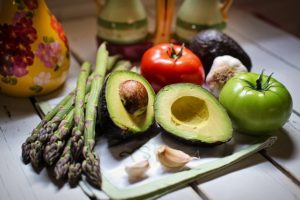Holistic Health means a proper balance of body,mind,emotions and energy level in our life at all time. It is not just merely the absence of diseases in our body.
Yoga and proper diet enhances the overall wellness of the physical body and mind. It also brings our emotions and energy in balance and will allow one to become meditative. A disciplined life guarantees the overall health of the individual, families, communities, states, and the nation.
Nutrition
Good nutrition is important to leading a healthy lifestyle. Combined with physical activity, your diet can help you to reach and maintain a healthy weight, reduce your risk of chronic diseases, and promote your overall health.
Eating a balanced diet is vital for good health and well being. Food provides us the energy, protein, essential fats, vitamins and minerals to grow, function and live properly. It is important to understand about the right amount of food and nutrients requirements of body for a healthy life.
Good nutrition happens when you eat food that has the right amount of nutrients required for your body. Not all necessary vitamins, minerals, and nutrients are available in a single food source. A proper diet should include a variety of different types of food which gives you a complete nourishment. Vitamins, minerals, fatty acids and dietary fibres are essential for a healthy diet. You can find all of these in plant based food in abundance.
How to plan a healthy diet?
- Pick high fibre food
- Choose food that contain less sugar
- Low in salt
- Less trans fat. Trans fat are usually artificially processed vegetable oils
What are healthy food?
- Try to make home made meals with whole food
- Include more vegetables and plant based items in meals
What you should avoid?
- Try not to eat processed food
- Make sure packaged product does not contain artificial flavours,preservatives or colours
- Avoid any refined carbohydrates. Some type of food with refined carbs are white flour based products (bread,naan), white rice (bleached rice), pastries, sweetened soda water and anything that has added sugar
Click here to READ MORE About risk of pre-packaged food…
About Natural Remedies
For thousands of years, different cultures around the world have practised natural remedies to improve the quality of well being. Natural remedies or home remedies are generally safe and recommends the use of vitamins, minerals, herbs, enzymes and essential fatty acids. The knowledge that has been passed on from generations to generations strongly recommends the use of plants, herbs and natural supplements to keep our immune system high and also to cure minor health issues in our day to day life.
The miraculous healing power of whole food, plants and herbs for well being is getting more and more recognition in all sections of societies. Natural remedies help to improve health of our body by detoxification, rejuvenation and proper nourishment.
NOTE: Natural Remedies are NOT a substitute for proper doctor’s diagnosis or medication. It may or may not have medicinal properties that treat or cure the disease or ailment in question.
READ MORE About Natural Remedies…

